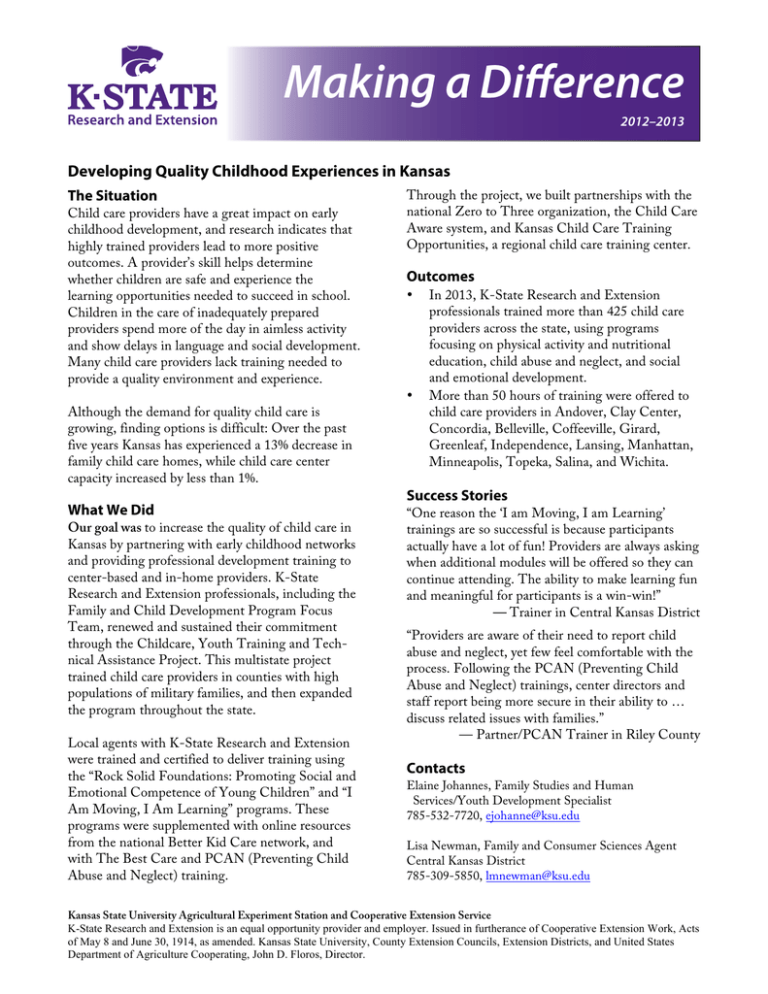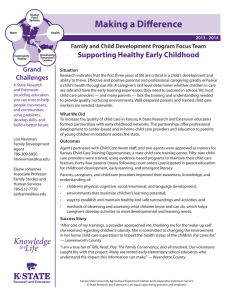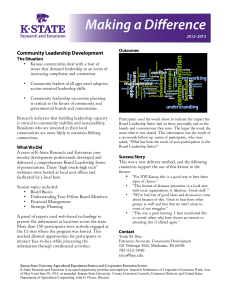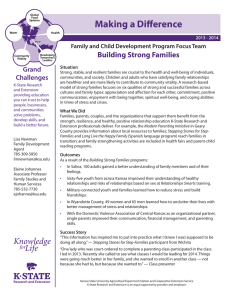Document 13271685
advertisement

Making a Difference 2012–2013 Developing Quality Childhood Experiences in Kansas The Situation Child care providers have a great impact on early childhood development, and research indicates that highly trained providers lead to more positive outcomes. A provider’s skill helps determine whether children are safe and experience the learning opportunities needed to succeed in school. Children in the care of inadequately prepared providers spend more of the day in aimless activity and show delays in language and social development. Many child care providers lack training needed to provide a quality environment and experience. Through the project, we built partnerships with the national Zero to Three organization, the Child Care Aware system, and Kansas Child Care Training Opportunities, a regional child care training center. Outcomes • • Although the demand for quality child care is growing, finding options is difficult: Over the past five years Kansas has experienced a 13% decrease in family child care homes, while child care center capacity increased by less than 1%. What We Did Our goal was to increase the quality of child care in Kansas by partnering with early childhood networks and providing professional development training to center-based and in-home providers. K-State Research and Extension professionals, including the Family and Child Development Program Focus Team, renewed and sustained their commitment through the Childcare, Youth Training and Technical Assistance Project. This multistate project trained child care providers in counties with high populations of military families, and then expanded the program throughout the state. Local agents with K-State Research and Extension were trained and certified to deliver training using the “Rock Solid Foundations: Promoting Social and Emotional Competence of Young Children” and “I Am Moving, I Am Learning” programs. These programs were supplemented with online resources from the national Better Kid Care network, and with The Best Care and PCAN (Preventing Child Abuse and Neglect) training. In 2013, K-State Research and Extension professionals trained more than 425 child care providers across the state, using programs focusing on physical activity and nutritional education, child abuse and neglect, and social and emotional development. More than 50 hours of training were offered to child care providers in Andover, Clay Center, Concordia, Belleville, Coffeeville, Girard, Greenleaf, Independence, Lansing, Manhattan, Minneapolis, Topeka, Salina, and Wichita. Success Stories “One reason the ‘I am Moving, I am Learning’ trainings are so successful is because participants actually have a lot of fun! Providers are always asking when additional modules will be offered so they can continue attending. The ability to make learning fun and meaningful for participants is a win-win!” — Trainer in Central Kansas District “Providers are aware of their need to report child abuse and neglect, yet few feel comfortable with the process. Following the PCAN (Preventing Child Abuse and Neglect) trainings, center directors and staff report being more secure in their ability to … discuss related issues with families.” — Partner/PCAN Trainer in Riley County Contacts Elaine Johannes, Family Studies and Human Services/Youth Development Specialist 785-532-7720, ejohanne@ksu.edu Lisa Newman, Family and Consumer Sciences Agent Central Kansas District 785-309-5850, lmnewman@ksu.edu Kansas State University Agricultural Experiment Station and Cooperative Extension Service K-State Research and Extension is an equal opportunity provider and employer. Issued in furtherance of Cooperative Extension Work, Acts of May 8 and June 30, 1914, as amended. Kansas State University, County Extension Councils, Extension Districts, and United States Department of Agriculture Cooperating, John D. Floros, Director.




